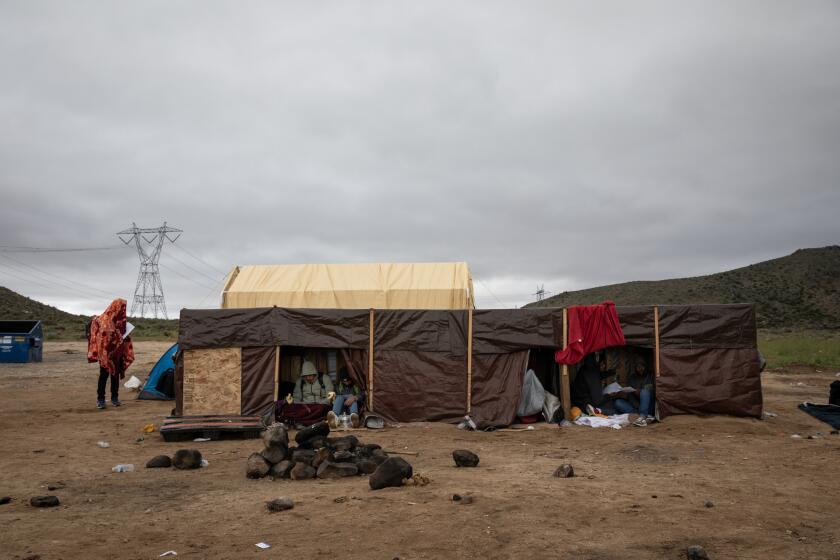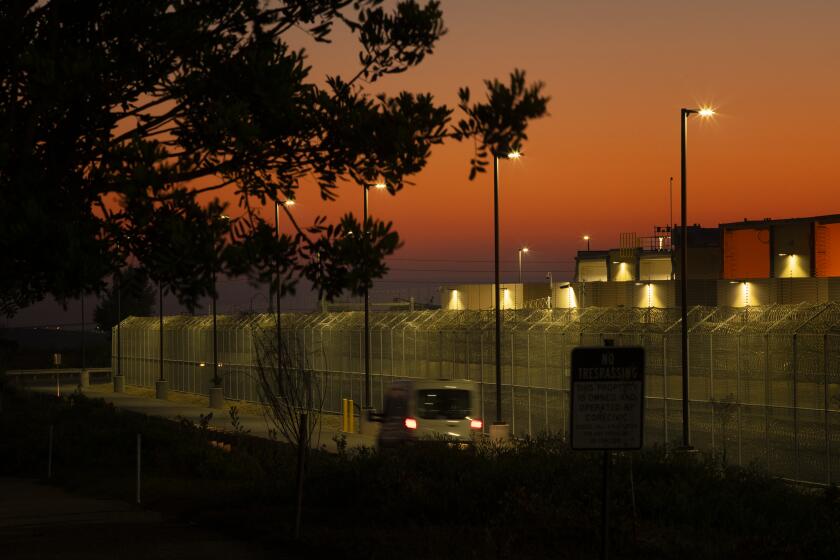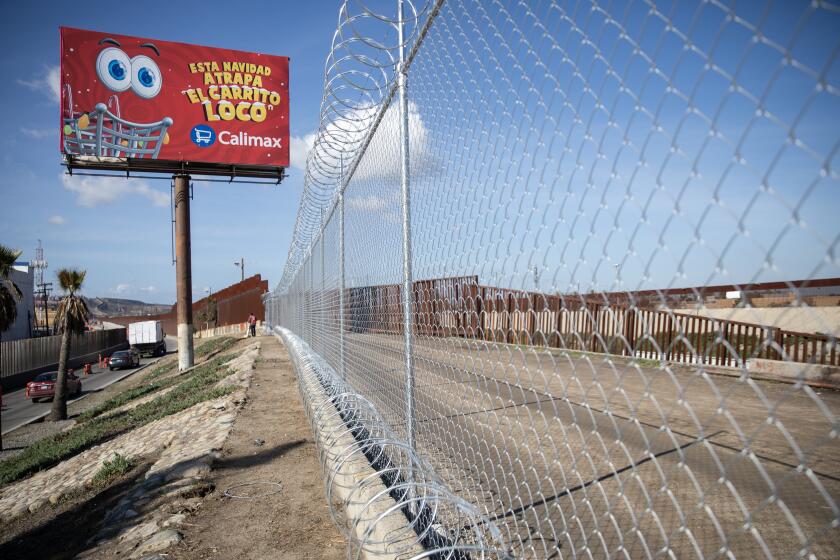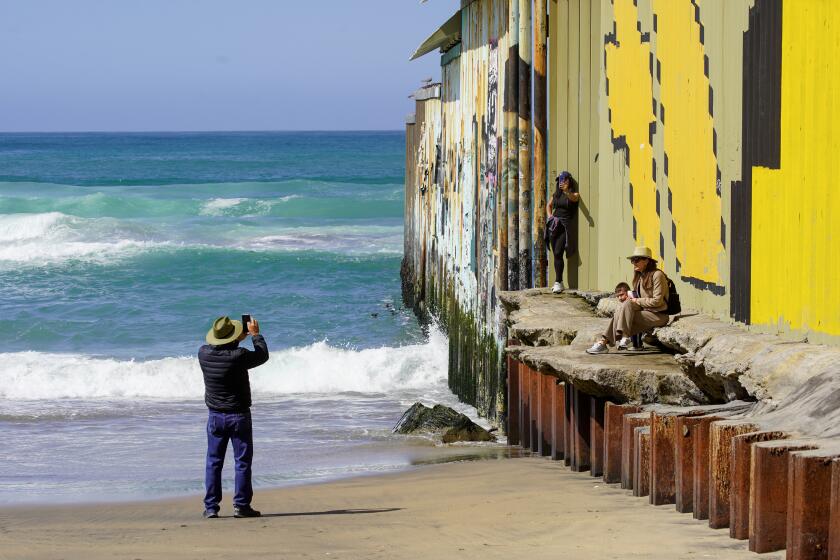CBP agents wrote fake court dates on paperwork to send migrants back to Mexico, records show
Documents show that CBP agents are writing false court hearing dates on paperwork to send migrants back to Mexico under the Migrant Protection Protocols program.
Asylum seekers who have finished their court cases are being sent back to Mexico with documents that contain fraudulent future court dates, keeping some migrants south of the border indefinitely, records show.
Under the Migrant Protection Protocols policy, asylum seekers with cases in the United States have to wait in Mexico until those cases are resolved. The Mexican government agreed to only accept migrants with future court dates scheduled.
Normally, when migrants conclude their immigration court cases, they are either paroled into the United States or kept in federal custody depending on the outcome of the case.
However, records obtained by The San Diego Union-Tribune show that on at least 14 occasions, Customs and Border Protection agents in California and Texas gave migrants who had already concluded their court cases documents with fraudulent future court dates written on them and sent the migrants back to Mexico anyway.
Subscribe to the San Diego News Fix wherever you get your podcasts
Those documents, unofficially known as tear sheets, are given to every migrant in the Migrant Protection Protocols program who is sent back to Mexico. The document tells the migrants where and when to appear at the border so that they can be transported to immigration court. What is different about the tear sheets that migrants with closed cases receive, is that the future court date is not legitimate, according to multiple immigration lawyers whose clients have received these documents.
This has happened both to migrants who have been granted asylum, and those who had their cases terminated — meaning a judge closed the case without making a formal decision, usually on procedural grounds. Additionally, at least one migrant was physically assaulted after being sent back to Mexico this way, according to her lawyer.
Bashir Ghazialam, a San Diego-based immigration lawyer who represents six people who received these fake future court dates, said he was shocked by the developments.
“This is fraud,” he said. “I don’t call everything fraud. This is the first time I’ve used the words, ‘U.S. government,’ and, ‘fraud,’ in the same sentence. No one should be OK with this.”
The Department of Homeland Security and Custom and Border Protection did not respond to multiple requests to comment about why they had engaged in the practice.
Ghazialam first noticed this in September, when three of his clients were sent back to Mexico after their cases were terminated on Sept. 17. After the judge made his decision, the family spent ten days in CBP custody.
On Sept. 27, the family was given a document that read, in part, “At your last court appearance, an immigration judge ordered you to return to court for another hearing.” That piece of paper told them to return to court on Nov. 28.
However the immigration judge ordered no further hearing. Ghazialam’s clients do not have a hearing scheduled on that day or any other day.
To confirm Ghazialam’s claims, a reporter called a Department of Justice hotline that people with immigration court cases use to check their status and dates of future hearings. That hotline confirmed that the family’s case had been terminated on Sept. 17, and that “the system does not contain any information regarding a future hearing date on your case.”
“That date is completely made up and the Mexican authorities are not trained enough to know this is a fake court date,” Ghazialam said.
After being returned to Mexico, the mother was stabbed in the forearm while protecting her children from an attempted kidnapping. She still has stitches from the knife wound, Ghazialam said.
The mother presented herself at the border shortly after the stabbing. She told Customs and Border Protection agents that she was afraid to stay in Mexico. The agents gave her a fear of return interview and tried to send her back to Mexico.
However, this time, Mexican immigration officials refused to let her and her children back to Mexico because they did not have a future court date, Ghazialam said. She is currently with relatives in New York , waiting to figure out the future of her legal status in the United States while wearing an ankle monitor.
In most of these cases, immigration attorneys aren’t aware that their clients were sent back to Mexico until it’s too late.
In one case, a Cuban asylum seeker was returned to Mexico after an immigration judge in Brownsville, Texas granted her asylum.
The woman’s lawyer, Jodi Goodwin, remembers hugging her client after the decision and arranging a place to meet after authorities released her later that day after processing.
Goodwin expected the process to take 45 minutes so she went to a nearby Whataburger and ordered a chocolate milkshake. About 40 minutes later, she got a phone call from her client.
“She was hysterical and crying,” Goodwin said. “I’m like, ‘what happened,’ and she says, ‘I’m in Mexico.’”
Goodwin called CBP and Mexican immigration authorities to try to find out what happened. She spent five hours at the border until 9 p.m. and then went back home to draft a lawsuit. It wasn’t until she threatened to sue CBP that her client was paroled into the United States.
“It was total chaos for 24 hours to try to figure it out,” Goodwin said. “It shouldn’t be like that, especially when CBP is blatantly lying. They are creating documents that have false information.”
The American Immigration Lawyers Association said the practice worried them.
“The idea that even though these vulnerable individuals are able to obtain an asylum grant from an immigration judge and CBP is sending them back to harm’s way in Mexico is really disturbing, especially under the guise that there’s a future hearing date,” said Laura Lynch, senior policy counsel for the organization.
In a statement issued Thursday morning, Mexico’s Foreign Affairs Ministry stated it will review cases of people who have been returned to Mexico even though their cases were closed and have no future hearing dates.
“Mexico only accepts foreigners who have a court appearance hearing date,” the statement read.
Additionally, the statement noted that the Mexican government’s policy is also to not accept any foreigners whose process of asylum was denied, save any humanitarian exceptions.
Although Ghazialam and Goodwin were able to eventually get their clients back in the United States, some people are still in Mexico.
That’s what happened to a Guatemalan woman and her two children after a judge terminated their case on Oct. 18.The same day the judge closed their case, a U.S. immigration official gave her a piece of paper with the false hearing date of Jan. 16, 2020.
“But this appointment does not exist,” said the woman’s New York City-based attorney Rebecca Press. “If you check with the immigration court system there is no January hearing date and the case has already been terminated.”
It’s unclear how widespread this practice is. Lawyers in San Diego, Laredo and Brownsville confirmed they have seen it firsthand.
However, only about one percent of asylum seekers in the Migrant Protection Protocols program have lawyers. Therefore it’s difficult to track what happens to the overwhelming majority of the people in the program.
Lawyers said asylum seekers without legal representation who have been sent back this way likely have no way of advocating for themselves. It took Goodwin hours of calls to high-level officials in both U.S. and Mexican immigration agencies plus the threat of a lawsuit to get her client back in the United States.
“If you don’t have someone who’s willing to sit around and spend five hours on the phone and stay up all night drafting litigation to force their hand, you’re going to be stuck,” she said.
As news of these false hearing dates spread among the immigration attorney community, some lawyers are taking proactive steps to protect their clients from being returned to Mexico after their court cases are closed.
Siobhan Waldron, an Oakland-based lawyer, wrote a letter to Mexican immigration officials explaining that her client had no future hearing date and outlined a step-by-step process Mexican officials could take to verify that her client’s case had been closed by using the Department of Justice hotline.
The letter worked at first.
When CBP officers tried to return Waldron’s client to Mexico on Nov. 1 with a false January 2020 hearing date, her client showed the note to Mexican officials, who refused to take her in. However, the next day, CBP officers sent Waldron’s client back to Mexico with another false court date and this time did not allow her to show Mexican officials her lawyer’s letter that she kept in a special folder, Waldron said.
“They didn’t let her take it out,” Waldron said. “They said, ‘you can’t present anything from that folder.’”
The lawyer plans to file, “any complaint you can imagine,” to CBP, DHS, and other regulatory agencies because, “these agents need to be held accountable.”
Her client is still in Mexico, too afraid to walk outside because she has already been kidnapped and assaulted, Waldron added.
Updates
10:47 a.m. Nov. 7, 2019: At 10:40 a.m. Mexican officials issued a statement regarding this report.
Get Essential San Diego, weekday mornings
Get top headlines from the Union-Tribune in your inbox weekday mornings, including top news, local, sports, business, entertainment and opinion.
You may occasionally receive promotional content from the San Diego Union-Tribune.













